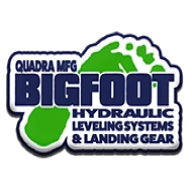Article Content
Written by the Getaway Couple Rae & Jason
The fifth wheel vs. travel trailer debate can cause some confusion. If you’ve decided to join the camping world and buy an RV, you have some decisions to make. Perhaps you know you want a towable RV, but you may not know whether a fifth wheel or travel trailer would best suit your needs.
How do you decide which one is best? Let’s take a closer look at the fifth wheel vs. travel trailer debate. Maybe then you’ll have a better understanding of what each type of towable has to offer!
Advantages of a Towable RV
Narrowing it down to a towable RV shows progress. Motorized RVs, sometimes called drivable RVs, certainly have their perks. But you’ll find some advantages to owning a towable RV.
First, you have a separation between your living space and your vehicle. Often this means more space inside the RV, even if your towable is shorter because you don’t have the front cab taking up several feet. The separation of home and vehicle also means when you travel, you can put more things in the truck or SUV and not take up room in the RV.
Having a separate vehicle is also advantageous once you arrive and set up at your campsite. Then you can take your tow vehicle and run into town to get groceries or take a ride on a scenic byway without dragging your entire rig with you.

Fifth Wheels vs. Travel Trailers at a Glance
Now let’s look at the fifth wheel vs. travel trailer dilemma. There are several differences worth noting. Once you have an idea of how you want to travel and where you plan to camp, you can make the best decision for your needs.
The differences below don't make one good or bad; they’re just different. Although you can set up a fifth wheel more easily, you have more towing options with a travel trailer. So just note both have pros and cons.
Size
Across the different types of RVs, size varies tremendously. You can drive a 30 ft Class A motorhome or a 40 ft Class A motorhome. You can find lightweight 30 ft long travel trailers and heavier 25 ft long ones. Whatever size you want, you can find one that works best for you.
In general, the space inside a fifth wheel will feel larger than the space inside a travel trailer because of the higher ceilings. If you compare a 34 ft travel trailer and a 28 ft fifth wheel, you might feel like the fifth wheel is bigger even though it’s several feet shorter. A fifth wheel’s ceiling measures about 9 ft compared to a typical travel trailer’s ceiling, around 6 to 7 ft, because the front cap sits over the truck’s bed. For taller individuals, this matters a lot.
Besides the ceiling height, fifth wheels tend to be longer and wider than travel trailers. They offer the most bang for your buck. Fifth wheels tend to have more room because of slides on opposing sides that make the space bigger. The master bedroom space also tends to be larger because of a slide.
Drivability
Fifth wheels will almost always win in the drivability category. This is because of the different types of hitch. A travel trailer, also called a bumper pull, attaches via a ball and hitch system on the back of the tow vehicle. Some people find pulling a travel trailer more difficult because there is less weight on the tow vehicle. Drivers experience more sway and less control, although a heavy-duty truck will help to eliminate some of that.
On the other hand, a fifth wheel attaches to a special hitch in the bed of a truck. Because it has several feet and a couple of thousand pounds of the RV in the truck’s bed, it places more weight on the rear axle. This means you have more control when towing.
The turning radius decreases because the fifth wheel hitch pivots to about 90 degrees. Drivers don’t have to swing out as far when making tight turns. The ride is also smoother when towing a fifth-wheel because of the hitching system.

Price
Usually, a fifth wheel will be more expensive than a travel trailer. Regardless of length, fifth wheels are heavier and require more production time due to the front cap design. If you have a smaller budget, you probably won’t find a fifth wheel to suit your needs.
A new travel trailer will cost around $25,000 to 35,000, whereas a new fifth wheel will start at around $40,000 but you can easily find models over $100,000. Again, this varies depending on size, options, and brand.
Interior Amenities
You can get about anything you want in either towable option. If you want a kitchen island, you can find travel trailers and fifth-wheel floorplans that offer one. Or suppose you want a bunkhouse, both towable RVs will have models that feature spaces for kids. If a residential fridge is a must-have, you can get one in a travel trailer or a fifth wheel as long as you have a 50 amp model.
So the inside amenities compare. The biggest difference inside is the ceiling height and number of slides. As already mentioned, these features make fifth wheels feel bigger and homier, even if they’re shorter.
Fuel Economy
Fuel economy has more to do with the size and weight of the towable RV than the actual design. Since fifth wheels tend to weigh more, they put more stress on the truck, increasing fuel consumption.
Additionally, many fifth wheels need to have trucks or diesel engines to tow them, which adds to the cost of fuel. A smaller travel trailer will be much more efficient traveling along the interstate or up mountain inclines because they don’t weigh as much.

Ease of Setup
This aspect of the fifth wheel vs. travel trailer debate is about the hitching system. Because you can easily unhitch a fifth wheel, setting it up feels like a breeze compared to setting up a travel trailer. The kingpin simply slides out of the hitch — no manual labor involved. Often, fifth wheels come with automatic leveling, so with the push of a button, your rig will be set up in a matter of a few minutes.
On the other hand, you have to do more work to unhitch a bumper pull. You have to raise the tongue and detach the sway bars and chains. Most require some sort of manual leveling, so you might spend more time setting up camp with a travel trailer.
Storage
Fifth wheels usually have more storage than travel trailers. This is due to their increased height. The front storage compartments are taller because of the 2 to 3 steps leading up to the front cap.
The bottom of the RV remains at the same height while the interior floor goes up about three feet. This gives you more storage space underneath. They also have the addition of the storage bay under the front cap that travel trailers don’t have because of the tongue.
Make Sure You’re Towing with the Right Vehicle
One of the most important decisions when choosing an RV is having the right tow vehicle. If you already own an SUV, you will need to look for travel trailers. You can’t tow a fifth wheel with an SUV.
You also want to pay attention to towing and payload capacity of trucks when considering a fifth wheel. Even though a fifth wheel may only weigh 9,500 lbs, its payload may exceed what your Ford F-150 with Ecoboost engine can hold. It’s recommended to tow fifth wheels with a three-quarter-ton truck or heavier so the rear axle can handle the extra weight.
You must pay careful attention to the GVWR of the RV to know what towing capacity your vehicle needs to have. Many RVers choose to follow the 80/20 rule, which means not exceeding 80% of the vehicle’s towing capacity. This leaves room for human error in any calculations and doesn’t put too much stress on the tow vehicle.

Which Towable Is Right for You?
Your dreams to visit state parks, mountains, and beaches can come true with the right RV. You just have to decide which type of towable will work best for you. When you’re shopping for your perfect RV, we recommend acting like you’re using it. Pretend to cook a meal, lounge on the couch, stand in the shower, and sit on the toilet. If you do this in enough RVs, you’ll be able to tell which floor plan and layout will work with your family.









